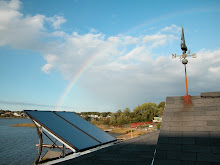Thursday, February 5, 2009
Deep Green
I call this post "Deep Green" because we need to look deeper at living a greener life. It is easy to think green and come up with recycling plans, ways to buy products with lower fuel miles, and how to lower our carbon footprint. It is easy to act green and buy energy efficient appliances, install solar panels, and bring our own bags to the grocery store. Do your long-term investments reflect your green values? When was the last time you went online and looked at the portfolio for your mutual funds? Are you unknowingly or inadvertently supporting oil companies, pharmaceutical companies and or mega chain stores? This is the time to act. There are at least five first-rate green mutual funds available. Do a quick search and you will find them. Green funds are down as much as everything else, if not considerably more. Research the green funds, find one which has holdings that appeal to your beliefs and make a substantial long term investment. Green funds are volatile so they are not suited for the short time. The market will rebound and I believe green funds will do well, especially considering the President's energy policies. Your "deep green" commitments will reward you financially as well as rewarding the planet.
Sunday, February 1, 2009
Help Desk
If you have any questions about plumbing, heating or alternative energy, please post a comment. If I don't have an immediate answer, I will ask my colleagues in the field and will post an answer for you shortly.
Net Metering
Many people generate their own power for a variety of reasons, living "off the grid," saving money, cutting down on greenhouse emissions, or just sticking it to the power company. For those who have not cut the umbilical cord of their energy provider with a battery storage system, you need to understand net metering. If you use electricity, your electric meter spins and records your usage for billing purposes. If you generate more energy from your photo voltaic panels, wind generator, methane generator, water wheel or any other source that you use, the excess power causes your electric meter to spin in reverse, sending the excess into the transmission lines. The power you supply into the system is like a savings account for electricity. When you use power, it is deducted from your "savings." At the end of the year, you want to have a "net" usage of zero or lower. In other words, you want to have generated at least as much power as you have used. If you have generated more power than you have used, you may be entitled to payment from your energy provider, as they are selling the electricity you supplied to other customers. You need to check your power company's policy on this. Usually you can find it on their website in the "riders" section. Some power companies simply pay you at the end of the year while some won't pay you unless you buy a license from them, which would usually cost more than the power you supply. Some require a separate meter that measures the amount or power you produce. You should also check your state's regulations on net metering. Regardless of whether you get payed for your excess power generation or not, you should strive for a net of zero. You might not be part of the solution, but you will no longer be part of the problem.
Subscribe to:
Posts (Atom)
